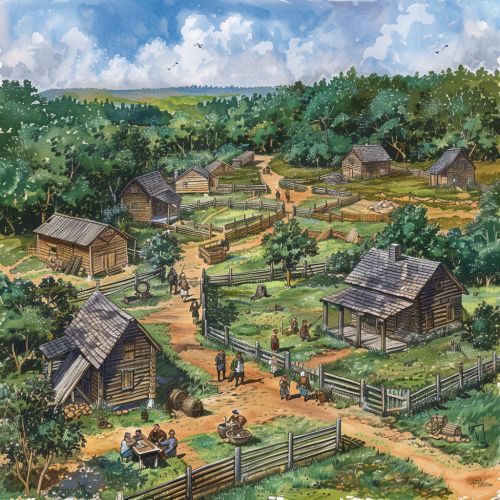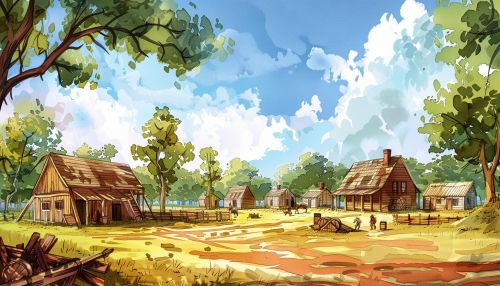European colonization of the Americas
Origins of European Interest in the Americas
The Age of Discovery marked the beginning of the European colonization of the Americas. This era, spanning the late 15th to early 17th centuries, was characterized by extensive overseas exploration, largely driven by technological advancements in navigation and a desire for trade expansion. The Portuguese and the Spanish were among the first to explore these new lands, driven by a quest for wealth, religious propagation, and territorial expansion.
First Contact and Early Settlements
Christopher Columbus's voyages in 1492, under the sponsorship of the Spanish Crown, marked the first contact between Europeans and the Americas. Columbus initially believed he had reached the East Indies, hence the misnomer "Indians" for the indigenous peoples. His voyages opened the way for widespread European exploration and the eventual conquest of the Americas.


The Spanish were the first to establish permanent settlements, beginning with La Navidad in present-day Haiti, founded by Columbus during his first voyage in 1492. The first successful Spanish settlement in the Americas was Santo Domingo, established on Hispaniola in 1496.
Spanish Colonization
The Spanish Empire's colonization of the Americas was extensive, covering much of South America, Central America, the Caribbean, and parts of North America. The Spanish implemented the encomienda system, granting colonists authority over indigenous peoples, leading to widespread exploitation and forced labor.
The Spanish also sought to convert indigenous peoples to Christianity, resulting in the spread of Roman Catholicism throughout their colonies. The Spanish influence can still be seen today in the prevalence of the Spanish language and Catholicism in these regions.
Portuguese Colonization
The Treaty of Tordesillas in 1494 divided the newly discovered lands outside Europe between Portugal and Spain. This treaty gave Portugal the right to colonize what is now Brazil. The Portuguese, like the Spanish, were driven by a desire to expand trade, spread Christianity, and increase their territorial holdings.
The Portuguese established their first permanent settlement in Brazil in 1532 at São Vicente. The Portuguese colonies in the Americas were governed as a part of the Portuguese Empire, with the monarch exercising direct authority.
French Colonization
French colonization of the Americas began in the 16th century. The French initially focused on exploring the Saint Lawrence River and establishing trading posts. The first permanent French settlement in the Americas was Quebec City, founded by Samuel de Champlain in 1608.
The French, unlike other colonizers, often developed cooperative relationships with the indigenous peoples, particularly in the fur trade. The French influence in the Americas is most evident in the French-speaking regions of Canada, particularly Quebec, and in the French-speaking Caribbean nations.
English Colonization
English colonization of the Americas began in the late 16th century, with failed attempts such as the Roanoke Colony. The first successful English colony was Jamestown, Virginia, established in 1607. The English established thirteen colonies along the east coast of North America, which would later form the United States.
The English colonies were distinct in their approach to governance, with a greater emphasis on self-government. The English also differed in their interactions with indigenous peoples, often leading to conflict and displacement of indigenous communities.
Dutch and Swedish Colonization
The Dutch and Swedish also established colonies in the Americas. The Dutch established the colony of New Netherland, which included parts of present-day New York, New Jersey, Delaware, and Connecticut. The Swedish established the colony of New Sweden, in present-day Delaware, New Jersey, and Pennsylvania.
Both the Dutch and Swedish colonies were eventually taken over by the English in the mid-17th century.
Impact of European Colonization
European colonization had profound impacts on the Americas. The introduction of European diseases decimated indigenous populations, who had no immunity to these new diseases. The European colonizers also imposed their culture, language, and religion on the indigenous peoples, leading to cultural assimilation and loss of indigenous cultures.
The colonization of the Americas also led to the Atlantic slave trade, with millions of Africans forcibly brought to the Americas to work on plantations. The legacy of this slave trade and the racial hierarchy it established continues to impact the Americas today.
Decolonization and Legacy
The process of decolonization in the Americas began in the late 18th century with the American Revolution, followed by the Latin American wars of independence in the early 19th century. However, the legacy of European colonization remains evident in the cultural, linguistic, and political landscape of the Americas.
